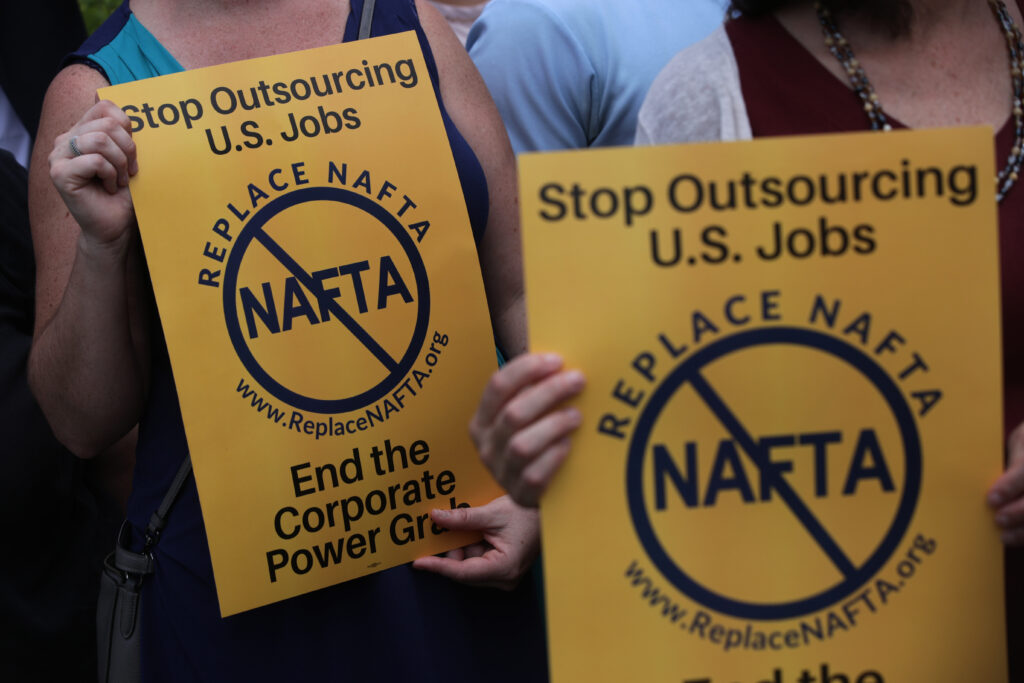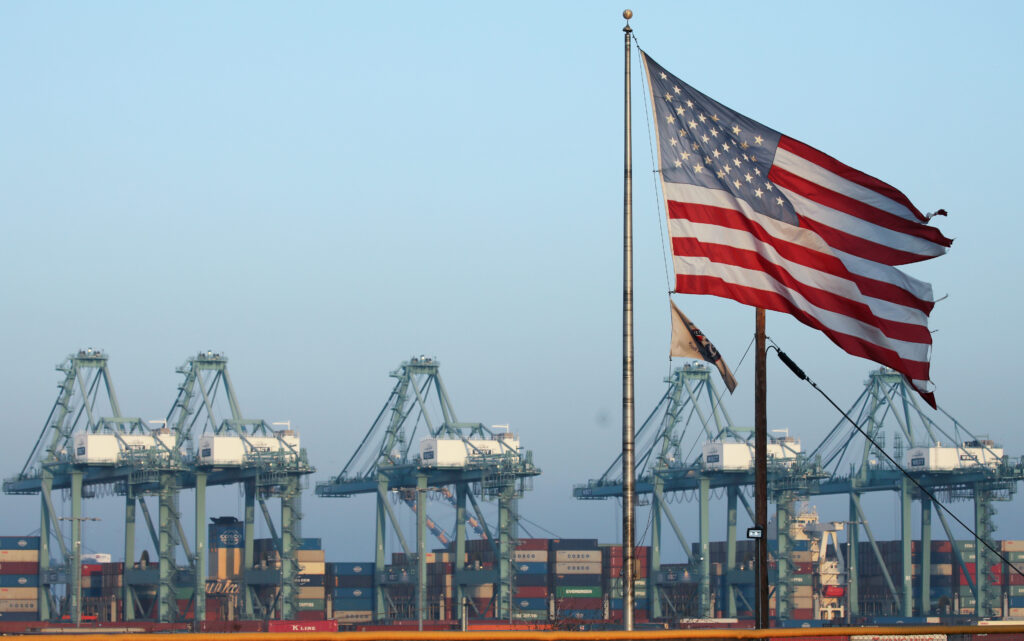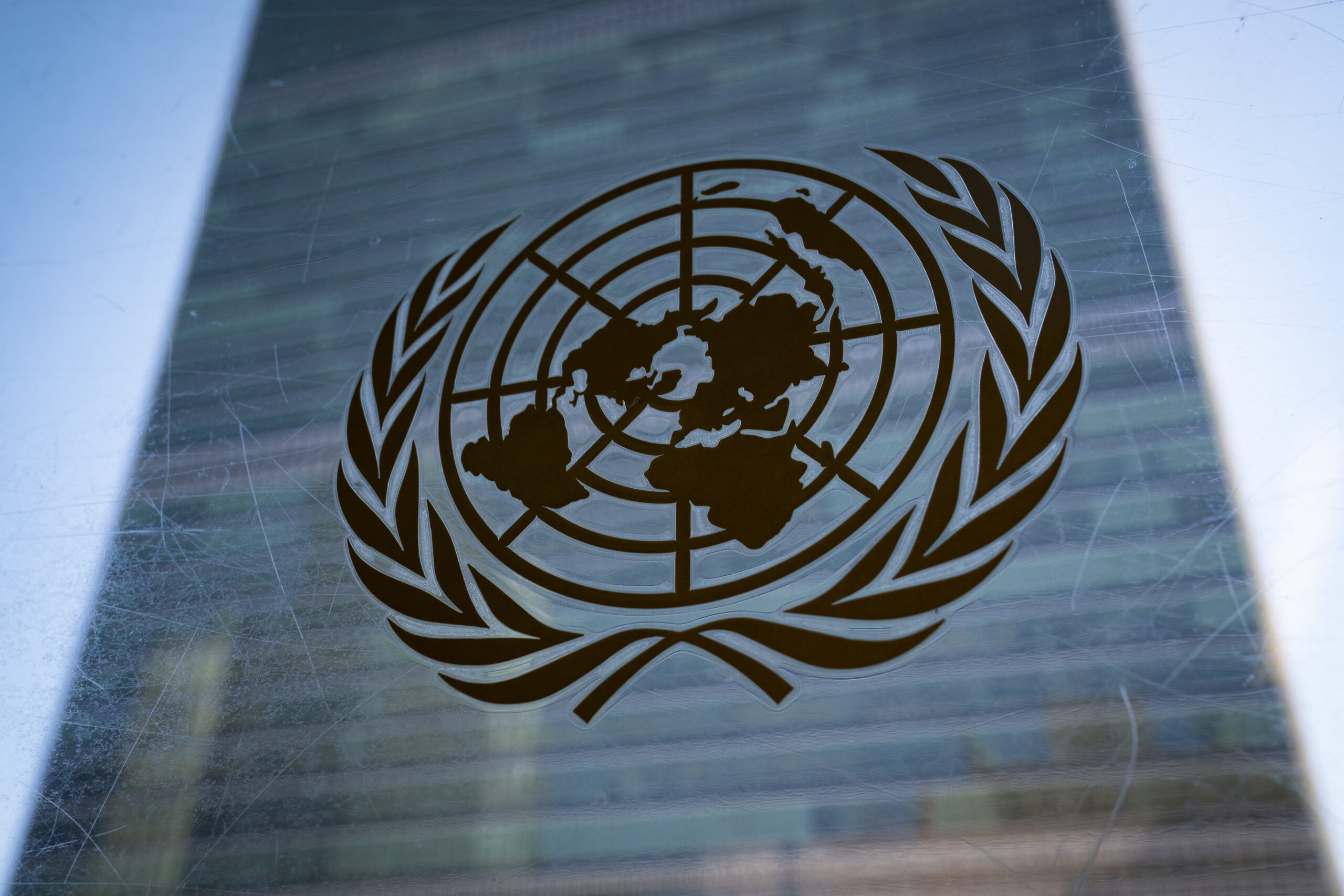This article is part of our series “On the Precipice: A Progressive Agenda in the Biden Era.” Download a PDF of the full series here.
2020 was a catastrophic year in many ways, especially regarding the pandemic, but it didn’t come out of nowhere. In the United States, it reflected, and was worsened by, President Donald Trump. That ugly political situation, in turn, resulted from years of failed economic, social and climate policies that increased inequality and corporate power. Bernie Sanders put it well in his recent interview with The Nation, “We have gotten a reprieve. Democracy has gotten a reprieve with Biden’s victory. That’s all it is. We did not win a rejection of what Trump stands for. We have got to ask ourselves, ‘Why are we at a place where democracy is now so very threatened, and what do we do about it?’ That is the question that every American should be discussing.”
Trade policy is a good example of that need for real change. Since the start of the Generalized Agreement on Trade and Tariffs (GATT) in 1947, trade agreements have evolved from basic rules intended to prevent conflicts. Now they are comprehensive and binding agreements designed to facilitate flows of goods, services and investment no matter what the cost to local economies, public health or our environments.
Since the early 1990s with the formation of the World Trade Organization (WTO) and the spread of bilateral and regional agreements like the North American Free Trade Agreement (NAFTA) this process has accelerated. In developing countries, those agreements locked in the trade liberalization and economic austerity programs imposed by the World Bank and International Monetary Fund starting in the 1980s. In the United States, free trade agreements exposed the lack of any coherent industrial policy. They did so by codifying a series of changes that eviscerated manufacturing jobs and family farms while undermining local efforts to set higher human rights or public interest standards. In 2016, part of Trump’s base, especially in the areas of the country that had been decimated by these free-trade agreements, gravitated toward him because his populist messaging against NAFTA and other trade deals.
Many of Trump’s erratic tariff actions disrupted markets and livelihoods, but they reflected that frustration with the mainstream consensuses on trade. President Obama’s administration promoted the expansion of a 1990s free-trade model in the Transatlantic Trade and Investment Partnership (TTIP) and the Trans Pacific Partnership (TPP). The Obama administration did little to defend popular programs like Country of Origin Labeling for meat or local content requirements for renewable energy from challenges at the WTO. For decades, both Republican and Democratic administrations had embraced investor-state dispute settlement (ISDS) in trade agreements, a mechanism that empowers corporations to sue governments over public interest laws overriding domestic sovereignty. ISDS came to symbolize to the public the drastic overreach of trade agreements into democratic decision making. ISDS was phased out between Canada and the United States and limited with Mexico in the renegotiated NAFTA agreement, the United States-Mexico-Canada Agreement (USMCA). After negotiations with Democratic majority in the U.S. House of Representatives, the ability of labor unions to challenge abuses was expanded in the final agreement. The shaky consensus on what belongs in trade agreements had cracked.

On the other hand, under Trump, new ways to let corporations overrule the public interest emerged. The renegotiated NAFTA includes a new chapter on “Good Regulatory Practices” that expands the ability of corporate stakeholders to delay and weaken public interest rules that might interfere with their profits. It includes a new chapter on digital rights that locks in current U.S. rules just as the public and Congress are starting to grapple with the need to tighten the regulation of the companies that control data.
The USMCA also continued the attack on Canada’s dairy supply management program despite the growing public demand to limit overproduction and waste, while ensuring fair prices to allow farmers to produce healthy foods more sustainably. Furthermore, the Trump Administration did nothing to improve transparency in the trade negotiation process, and the actual content of current trade negotiations is still secret. Nonetheless, it is entirely probable that these insidious provisions are also included in the agreements that the U.S. is negotiating with the U.K. and Kenya.
Learning from mistakes
President-elect Joe Biden is weighing his options on trade policy. He has stated that his first priorities will be to address the COVID-19 pandemic and start to rebuild the fragile U.S. economy. He is facing pressure from free traders in both parties who are eager to get back to business as usual. But it is a positive sign that he has pledged not to jump into any new trade deals. In a December interview with the New York Times, Biden affirmed his campaign promise for a moratorium on new trade deals, saying “I’m not going to enter any new trade agreement with anybody until we have made major investments here at home and in our workers.”
Those investments, including his pledge to expand Buy America programs to help promote a green economy, could run into conflict with existing trade commitments. In 2019, a WTO dispute panel ruled that renewable energy policies that supported local green jobs in eight U.S. states violated international trade rules. The case was brought by India against policies promoting renewable energy that included preferences or incentives for “local content,” meaning that some aspect of the energy or fuel must be produced in that state to gain the preference.
What’s significant here is not only the outcome, but also the reasons the dispute emerged. IATP’s Ben Lilliston commented on the ways short-sighted export promotion can undercut job creation and climate solutions in the U.S. and abroad. India brought the case in response to an Obama administration challenge at the WTO to India’s solar program that was decided in favor of the U.S. in 2016. India’s program gave preferences to local solar panel companies and was touted as a green jobs program and a vital part of the country’s Paris Climate Agreement commitment. The U.S. argued that India’s policy discriminated against U.S. solar panel manufacturers interested in export opportunities. Biden should stop taking aim at other countries’ efforts to build greener economies. Trade rules should provide protection from public interest harms but not quash initiatives needed to satisfy local preferences and environmental imperatives. In order to meet our global climate challenge, this point is imperative.
Biden could also direct both his agriculture and trade teams to learn from Canada’s successful experience with supply management for dairy production. That program has been an inspiration for U.S. dairy farmers confronting unstable markets, overproduction and low prices. President Trump complained about the unfairness of Canada’s protection of its dairy market and called for it to be abolished. Tom Vilsack said as much in the past. Vilsack, the former Obama-era head of the Department of Agriculture, and most recently a lobbyist for big agriculture, is Biden’s controversial nominee for Secretary of Agriculture. Rather than joining demands to open up Canada’s markets, the Wisconsin Farmers Union, National Family Farm Coalition and the International Brotherhood of Teamsters, among others, have pointed out that not only is the entire Canadian market too small to make any real difference in the crisis confronting U.S. dairy farmers, but, more fundamentally, that the U.S. should instead learn from the Canadian experience to curb oversupply and low producer prices in the U.S..
Ongoing Deals
It’s not clear yet if the announced pause on new trade agreements includes the U.S.-U.K. deal, which by some reports is close to completion, or the U.S.-Kenya FTA, which is also under negotiation but appears to be at an earlier stage. A comprehensive moratorium on trade agreements could create space to reassess the goals for international trade. The multisectoral U.S. Citizens Trade Campaign urges Biden to “Firmly reject the failed trade model of the past by halting Trump-era trade negotiations with Kenya, the United Kingdom and within the World Trade Organization; prioritizing the creation of a new model of trade agreements in partnership with Congress and civil society organizations; and renegotiating existing trade agreements to conform with that new model.”
Moving forward with negotiations on either of these agreements absent a complete rethinking of trade policy and goals would be a huge mistake. There has been little public debate in the U.S. on the proposed trade deal with the U.K., but it could have profound implications now that the U.K. is outside the European Union. Writing about a joint submission with the U.K. network Sustain to the House of Lords, IATP senior attorney Sharon Treat, commented that, “One consequence of the U.K. leaving the EU and its Common Agricultural Policy is that the country has the opportunity to establish its own agricultural policies and farm support schemes. If the U.K. and U.S. agree to a low-standard trade deal, the U.S. will effectively further embed industrialized, climate-harming agriculture well into the future, while the U.K. will accelerate its adoption of those same destructive practices and miss out on an opportunity to chart a different, more sustainable future.”

Similarly, the proposed U.S.-Kenya deal could undermine regional integration, now proceeding under the Africa Continental Free Trade Agreement. The proposed deal would lock Kenya into deregulatory policies that undermine current and future regulations. For instance, U.S. biotech firms have pushed USTR to take aim at Kenya’s legislation restricting the use of GMOs and harmful pesticides. Greenpeace uncovered pressure in the trade talks to weaken Kenya’s adherence to the new protocol to the Basel Convention on toxic wastes. Rep. Earl Blumenauer, chair of the House Ways and Means Trade Subcommittee, warned, “What they are trying to do is not good policy for Kenya or for the United States and it’s an example of where trade agreements need to be more transparent.”
The Kenya agreement also has broader implications for regional integration in Africa. The Trump administration clearly stated its intention to base this agreement on the new NAFTA, and to make that the pattern for future trade agreements across the African continent. Kenya already has substantial access to the U.S. market for its exports, primarily textiles, coffee and other agricultural goods. The Biden-Harris campaign platform includes a renewed commitment to U.S.-Africa relations based on mutually respectful engagement. An early decision by the Biden administration to halt the bilateral talks and open discussions with African nations and civil society on the elements of a different relationship on trade and development would be an important first step toward that goal.
Finding allies on the trade and climate conundrum
Biden has pledged that the U.S. will rejoin the Paris Climate Accords. That is an important step, but in recent years, trade policy has been an impediment to progress on climate change. ISDS challenges have been lodged against dozens of efforts around the world to rein in fossil fuels, including a $15 billion lawsuit brought by TransCanada against the U.S. for its rejection of the Keystone pipeline (which was resolved when Trump agreed both to move forward with the pipeline and to refrain from requiring that the construction create U.S. jobs). Citizens Trade Campaign insists that Biden, “Defend a livable future and create green jobs by prioritizing climate action in trade policy, including through the adoption and enforcement of strong, cross-border climate standards and an end to investor-state dispute settlement.”
Meaningful progress to confront the climate crisis will require difficult decisions about the terms of global trade. In addition to removing obstacles like ISDS from bilateral and regional agreements, and negotiating space in WTO rules for local job creation in renewable energy programs, there are questions about how to manage trade when countries are at different stages of a transition to cleaner production. The European Union is already considering the use of a Carbon Border Adjustment Measure (CBAM), which would tax carbon-intensive goods at the border to reduce the temptation to avoid stringent environmental standards through imports and to ensure local businesses can compete while lowering their emissions. The idea behind CBAM is both to discourage offshoring of polluting industries and to encourage cleaner domestic production. The initial proposals cover steel, cement and coal, but there are proposals to extend those rules to other products, potentially including meat and other agricultural goods. Biden’s campaign proposals include similar measures for a carbon tariff.
Even beyond the difficult technical issues around how to measure and compare emissions (and at which stage of production), the unilateral imposition of a carbon border measure raises fundamental questions of fairness. This becomes even clearer in the absence of adequate funding or technology transfer for developing countries to make transitions to cleaner production methods while also bolstering their local economies. This too will require honest, respectful conversations with other countries about the best ways to achieve those goals.
Biden has clearly stated his intention to return to multilateralism, to rebuild ties with allies around the world. Much of that will undoubtedly involve talks with those allies on the best way to reengage with China. The WTO is at an impasse, both because of the Trump administration’s refusal to name jurists to the WTO’s dispute resolution mechanism and because of political resistance among many WTO members to the overreach of international trade rules into finance, services, agriculture and other sectors. This too will require an admission that the idea of business as usual is exactly the wrong idea for this moment. It will require learning from innovative local and national solutions to pressing world problems and considering how those solutions could actually be supported by trade policy.
And perhaps that’s the fundamental issue. Biden has said the U.S. should lead, but really, it should learn to listen.
Karen Hansen-Kuhn is program director at IATP. She leads IATP’s work on trade policy and ensures synergies among our programs on trade, farm systems and climate and economic justice.



